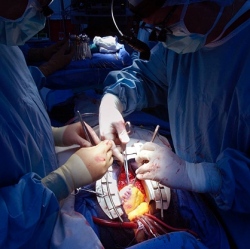
A team from Korea has developed a self-powered artificial cardiac pacemaker operated semi-permanently by a flexible piezoelectric nanogenerator. Currently, pacemaker batteries last seven years on average, requiring frequent replacements, which may pose patients to a potential risk involved in medical procedures.
The nanogenerator directly stimulated a living rat’s heart using electrical energy converted from the small body movements of the rat. The research team fabricated high-performance flexible nanogenerators utilizing a bulk single-crystal “PMN-PT” thin film energy harvester. The harvested energy reached up to 8.2 V and 0.22 mA by bending and pushing motions, which were high enough values to directly stimulate the rat’s heart.
“For clinical purposes, the current achievement will benefit the development of self-powered cardiac pacemakers as well as prevent heart attacks via the real-time diagnosis of heart arrhythmia,” said Professor Keon Jae Lee of the Department of Materials Science and Engineering at KAIST. “The flexible piezoelectric nanogenerator could also be utilized as an electrical source for various other implantable medical devices.”
